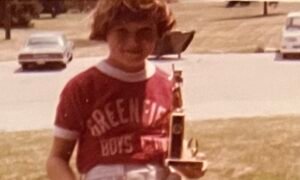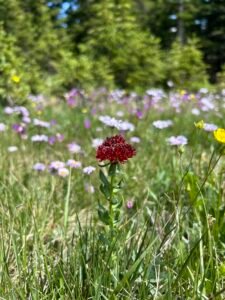I’m doing some heavy editing on my memoir again. It never feels quite right, and it’s such an important story for me to tell that I can’t stop rewriting and rearranging. (Annnnd… if I’m constantly rewriting, I never have to actually put it out into The Universe, right? I recognize self-sabotage when I see it.)
As a number of brilliant writers before me have said, “You must kill your darlings.” It’s hard to cut painstakingly crafted words and sentences and chapters, but if they don’t contribute to the story, it’s time to let them go.
Chapter 9 is a prime example. But because of the beauty of the internet, I get to share it with you before I retire it forever.
I give you: The chapter formerly known as 9 from my memoir, Hurricane Lessons.
~ ~ ~
I first drove the terrain in a 1963 Ford Falcon. Then came the Escort, the Saturn, the wood-paneled RoadMaster, the Suburban, the Tahoe. The vehicles changed, the view evolved, but that same stretch of straight highway flanked by cornfields and weather-beaten billboards always brought me to the same place.
Home.
This time, I’d left my husband and four kids in our new Ohio home and had driven to spend the weekend with my beloved mom. Her health was in decline, her spirit equally mired in shade, her once ever-present smile elusive. We were in need of each other’s company. My sister and brother-in-law would be there, too. My niece, her husband, my grandniece, my nephew and his girlfriend. And Bob, my beloved stepfather, our mom’s devoted caregiver. We would gather and laugh and break bread and drink wine.
But first.
First, the steady and trustworthy wheels of my Tahoe had a side trip to make. So I drove into the heart of Greenfield, right back to my childhood.
I felt like a giant in the land of Lilliputians as I journeyed to St. Michael’s School. The houses I passed on Jefferson Street, the ones that once seemed so big and out of reach were now merely quaint cottages in my world of excess. I had grown used to homes too big to clean in one fell swoop, to yards that took hours to mow. In many ways, I had outgrown my childhood home, and in so many more, it was still an integral part of me, an irreplaceable, permanent piece of my existence.
Just down the road, beyond the three blocks I’d walked twice a day for eight years wearing my plaid Catholic school jumper and white blouse, sat Weston Village Apartments. The field across the street, the one in which I’d built cardboard forts and smoked contraband cigarettes and sworn blood pacts with my friends, was now fenced off and crisscrossed with tiny tract homes. The frozen ground I’d traversed in my dirty white ice skates was now someone else’s private property.
But 317-B. There she was. Second floor apartment. There was the bedroom window my sister and I shared on the brick side, my mom’s bedroom window to the left on the vinyl side. Different curtains now, different residents, same feeling.
Around the corner was the basketball goal where I’d spent the better part of my after-school hours. When I wasn’t riding my bike to Hooks Drugs to pick up a pack of Merit Ultra Lights for my mom or a watermelon Jolly Rancher stick for myself, I was there, perfecting my free throws, challenging all the neighborhood boys to a high-stakes game of “Horse.” I’d take their money when I won, and I never looked back. Respect. You had to earn it on the court via a wicked quick jumper—especially when you were a freckle-faced girl with unruly auburn tresses and hand-me-down clothes.
The remembered smell of hot, sweaty summer days wafted through my vents even though it was a freezing, twenty-eight degree February evening. I drove past my old babysitter’s house, a “For Sale” sign lodged in the frozen earth. I toyed with the idea of buying that house, the one where we spent all our Christmas Eves, the one in which I stole a coveted Rosary. But it was a fleeting thought, a fruitless conversation with my own sentimentality. We lived in Ohio now, not in Indiana. My childhood was not my children’s childhood.
I drove the back roads to my mom’s current house, took the route I would have traveled on my baby blue Schwinn to visit my best friend, Karen, or to sneak a swim in my cousins’ backyard pool. There was the Dairy Queen, the outer reaches of Eli Lilly’s research land. Single-family homes now rose up from the fields that were once tall and fragrant with summer corn and heavy with mosquitoes. When I’d pedal home in the evening, racing against the impending dark with a bike light powered only by the motion of my legs, those same fields would glow with a hazy firefly light. The magical green-bellied bugs would dance and dart and occasionally splatter against my legs as I rode, driven by adolescent hunger, toward a heaping plate of Kraft Macaroni and Cheese mixed with StarKist tuna and a cold glass of 2% milk, Hostess Twinkies for dessert.
When I finally pulled into my mom’s driveway that late February evening, I sat for a moment and thought about my high school years in this home. I was almost grown by the time Mom remarried, was already thinking about the what-comes-next. This house, too, had been mine, but only briefly. My childhood rested on the other side of town, where the edges were a little rougher.
Inside her Bowman Acres home, my mom sat in her bed, water glass by her side, TV blaring, recovering slowly, slowly from her latest hospital stay. The pneumonia had worn her down, had claimed another little piece of what I once believed was an indomitable spirit. Now I saw her human frailty, the limits of her body.
I climbed into the bed beside her and settled in for the weekend.
“What can I do for you?” I asked, kissing her pale, papery cheek.
“Nothing,” she said. “Nothing. I have everything I need.”
Then she reached out with her frail hand. Those hands that once fed me, protected me, brushed my hair, treated my skinned knees, wiped away my tears.
“I just need to touch you.”
It’s all we both needed, really. I gently rubbed her translucent skin, laid my head on her stooped shoulder, breathed her in. Above the bitter odor of the medicine bottles, of the stale air of a recovery bed, I smelled my mom. Her Dove soap, her lilac hand lotion, her shampoo. Still the same after more than four decades, still a comfort to my adult-sized heart.
The smell of home.
The feel of home.
Right there, always, in the familiar grasp of my mother’s beautifully wrinkled hands.




